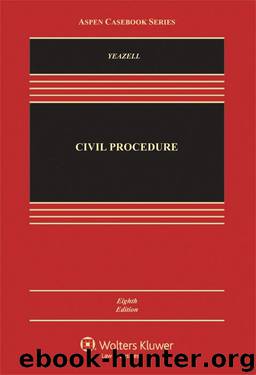Civil Procedure (Aspen Casebooks) by Stephen C. Yeazell

Author:Stephen C. Yeazell [Yeazell, Stephen C.]
Language: eng
Format: epub
Publisher: Aspen Publishers (Wolters Kluwer Legal)
Published: 2013-04-13T04:00:00+00:00
* * *
W H A T ’ S N E W H E R E ?
• Discovery cases focus on whether information sought in discovery must be produced. The information here (the vehicle) disappeared before a lawsuit was filed and therefore before any discovery could have been requested.
• The court finds a duty to preserve potential evidence—and imposes sanctions for violating that duty. Where does the court find the duty, if not in the discovery rules?
* * *
* * *
Notes and Problems
* * *
1. Suppose that the day after the collision, the company that had towed the vehicle from the collision scene contacts Mr. Silvestri’s landlady, the owner of the vehicle, and gives her a choice of selling the vehicle to a junkyard, or paying a daily storage fee. She tells them to send the vehicle to a junkyard, and it is dismantled for parts—before any lawyers or experts had examined the vehicle. Would she have violated any law? Would she have any civil liability to Mr. Silvestri or General Motors? On what theory?
2. What options did the court consider as possible sanctions for what it believed to be either negligent or willful misconduct by Mr. Silvestri’s counsel in failing to notify General Motors? Can you think of other options that the court did not consider?
a. Suppose that immediately after the collision, Mr. Silvestri and his parents had not given any thought to bringing a lawsuit—assuming that there was no one to blame for the collision (and his facial disfigurement) other than Mr. Silvestri himself. Two years later, before the expiration of the statute of limitations, Mr. Silvestri reads a newspaper article about a lawsuit concerning defective airbags, and goes to see a lawyer. The lawyer then commences suit against General Motors. The vehicle has long since gone to the junkyard and neither side had a chance to examine it. Should the lawsuit be allowed to proceed?
b. If so, would it had have been equally fair in Silvestri to allow the case to proceed, but to prohibit plaintiff from relying on any expert evidence based on examination of the vehicle?
3. Review the court’s analysis of the extent of prejudice to General Motors if the case is allowed to proceed. To determine prejudice, should the court consider whether the missing evidence would likely have helped General Motors? Is there any basis for doing so other than speculation? What if the experts retained by the plaintiff had performed some or all of the tests that General Motors claimed it would like its experts to perform? Would the mere fact that different experts might come to different results be enough to find prejudice?
4. Did Mr. Silvestri himself do anything wrong? Is it fair to impute to him the negligence or willful misconduct of his counsel? Why?
a. After finding out that his case was dismissed because his lawyer failed to give General Motors an opportunity to examine the vehicle, should Mr. Silvestri have a claim for malpractice against his attorney? In order to recover on such a claim, Mr.
Download
This site does not store any files on its server. We only index and link to content provided by other sites. Please contact the content providers to delete copyright contents if any and email us, we'll remove relevant links or contents immediately.
Objection! by Nancy Grace(1328)
Anatomy of Injustice by Raymond Bonner(1267)
Apeirogon by Colum McCann(1237)
That Every Man Be Armed by Stephen P. Halbrook(1236)
Injustices by Ian Millhiser(1196)
The Vaccine Court by Rohde Wayne(1187)
Civil Procedure (Aspen Casebooks) by Stephen C. Yeazell(1170)
Storytelling for Lawyers by Meyer Philip(1133)
Restitution by Restitution(1111)
A Practical Guide to International Arbitration in London by Hilary Heilbron(1077)
Tangled Webs: How False Statements Are Undermining America: From Martha Stewart to Bernie Madoff by James B. Stewart(1025)
Coercing Virtue by Robert H. Bork(1022)
The Tools of Argument: How the Best Lawyers Think, Argue, and Win by Joel Trachtman(1022)
Broken Scales by Joel Cohen(1015)
INDEFENSIBLE: One Lawyer's Journey Into the Inferno of American Justice by Feige David(1009)
American Tragedy by Lawrence Schiller & James Willwerth(954)
A Religious Orgy in Tennessee by H.L. Mencken(947)
A Matter of Interpretation by Antonin Scalia(935)
Tangled Webs by James B. Stewart(921)
